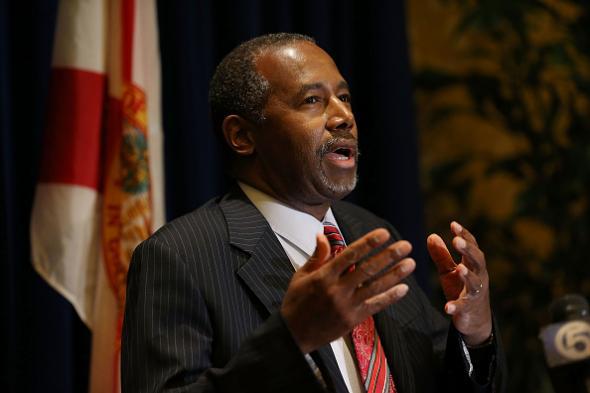One of several seemingly exaggerated/fabricated/dishonest claims for which Republican presidential candidate Ben Carson is currently taking heat is a story in his 1990 autobiography Gifted Hands about having been given a cash reward for honesty by a psychology professor at Yale when he was a student there. In his book, Carson writes that during his junior year he was having money problems when the professor teaching a class called Perceptions 301 posted a notice that said a number of final exams, including Carson’s, had been lost in a fire and needed to be retaken. Carson writes that when he went to retake the exam, it was much harder than the one that had been lost, and all the students except him left the test room (apparently planning to claim they hadn’t seen the notice about the second, harder exam). At this point, per Carson, the professor then emerged, told him the whole thing had been a test to find the most “honest” student in the class, shook his hand and gave him $10 (about $57 in today’s dollars). Voilà—money when he needed it, just for being honest.
But: The Wall Street Journal reported this weekend that there’s no evidence that such a class existed when Carson was at Yale, to which the candidate responded by posting an article from the Yale Daily News … which describes an incident during Carson’s freshman year during which the Yale Record humor magazine, not a professor, pranked students in a Psychology 10 class by posting a fake notice about exams being destroyed. Last night, BuzzFeed posted an interview with someone who worked for the Record who elaborated. That individual, Curtis Bakal, says that while he wasn’t present for it, he knows that the Record did host a fake second Psych 10 test at which students who remained until the end were given some money.
So what we appear to have here, as Mother Jones’ Kevin Drum points out, is Carson taking a real event—him getting some money after getting pranked by a humor magazine during his freshman year—and turning it into a similar but much more flattering and meaningful incident in which he was paid and celebrated for his honesty by an authority figure. What it’s quite reminiscent of, actually, is Brian Williams turning a 2003 incident in which he was near the area of some helicopters that were shot at in Iraq into an incident during which he was personally shot out of the sky in a way that both highlighted his journalism bona fides and foreshadowed the power of the Iraqi insurgency. (Incidentally, Williams is still talking about that incident in a way that, at best, is disingenuous and misleading.)
The other high-profile Carson anecdote under scrutiny right now also fits this pattern. Carson wrote in 1990 and has said for years since that he was offered a full ride to West Point (and passed it up) after having met top Vietnam general William Westmoreland when he (Carson) marched as a ROTC cadet in a Detroit Memorial Day weekend parade in 1969. But in reality Westmoreland didn’t visit Detroit that weekend and Carson never actually went through the West Point application process; he never actually had a real offer of anything. At the moment, what seems like the most likely version of events is that Carson saw Westmoreland at a February Detroit event and may have been told that he probably could get into West Point (where all cadets receive a full ride in exchange for post-graduation service) given his credentials.
In other words, the reality is both less flattering to Carson and less dramatically meaningful (a special scholarship offer after a military parade during the heart of the Vietnam era!) than his story, which he told in a book about his own greatness. And that’s where Carson’s (and Williams’) methods differ from the kinds of narrative shortcuts and simplifications that we all use in telling anecdotes about ourselves. They get details wrong (freshman year, junior year) and impose larger themes onto disparate groups of events the way that we’re all liable to. But they’re not telling these stories to make their friends laugh or to try to make personal sense of complicated developments in their lives: They’re telling them to make themselves more famous and successful at the expense of both the truth and other people in their fields who are more honest than they are. Some people call this “embellishment,” but there’s another word for it, too: bullshit.
